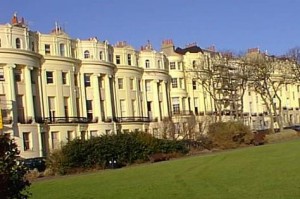search the site
The Conspiracy & Buried Evidence
The “buried” evidence included direct threats of violence to Raja and his son from the original prime suspect and included criminal damage to a flat in Brunswick Square, Hove, owned by Raja.
These threats arose during a long-running and acrimonious legal dispute between Raja as leaseholder, and a Lebanese petty crook, arsonist and fraudster as freeholder of 6 Brunswick Square, Hove.
The Lebanese had twice vandalised the flat owned by Raja and set fire to it, after having used similar tactics to obtain the other flats in the building which he had acquired in 1994 for only £1,500 and registered in a false name. The low price was due to the fact that all the flats had been sold off on 99-year leases at low ground rents.
However, Raja was proving more difficult to dislodge than the other leaseholders. Shortly before Raja’s murder, an “enforcer” employed by the Lebanese directly uttered the chilling threat to Raja at 6 Brunswick Square that if he did not drop the court case he “would not live to see the millennium”. Shortly after the murder the Lebanese arranged a further arson attack on the flat and forfeited the lease by re-possession.
The Lebanese denied to the investigating police that he was the owner of the building by stating that he was only the “manager” for the owner who lived abroad. In fact, had the police properly investigated at the time, they would have discovered from the Land Registry that the Lebanese, under a false name, and his two sisters were the owners. Some 18 months later, as part of the conspiracy to have Nicholas arrested for the murder, Raja’s son sold the flat to the Lebanese for £30,000 against a true value of at least £100,000.
The third (out of five) known member of the conspiracy was the main police “leg man” investigating officer in the case, a low-mentality failure of 30 years service who was still only a Detective Constable. He had retired in October 2001 – some six months prior to the start of the trial – but had taken, and kept at his home in contravention of procedure, his A4 100-plus page notebook that detailed a large percentage of his clandestine and undisclosed dealings with the Lebanese over the period March 2000 to September 2001. It was finally produced by the police four weeks after the trial had started, following persistent demands by Nicholas.
This notebook included the exact words suggested by him to the Lebanese to pass on to Nicholas in order to encourage Nicholas to flee abroad whilst on bail: “They will lock him up and throw away the key” – “Look what they did in the Jill Dando case” – “We don’t want him to come back”.
These matters were the subject of a cross-examination in the absence of the jury, during which the Detective Constable admitted that the “we” in “we don’t want him to come back” referred to himself, the Lebanese and Raja’s son.
Furthermore, the police deliberately arranged the destruction of the two remaining blood samples alleged to link one of the Raja assailants to the crime scene, so that it would be impossible for the defence to have the samples independently tested.
This dishonest police action followed on immediately after the prison department, acting on instructions from the police, had illegally opened and photo-copied privileged correspondence with legal advisers that had arranged payment for the independent tests. Previously such independent testing by the defence was not possible due to the Legal Aid Board refusing to make funding available.
This and other similar devastating evidence, not only against the integrity of the Prosecution, but pointing to a criminal conspiracy between three members of the investigating police team, their main suspect and the Raja family, was all hidden from the jury.
The discovery during the trial of such dishonest conduct amounted to a serious abuse of process which should have collapsed the trial – however, (In)Justice Newman ruled otherwise.
This bigoted and psychotic “judge” misdirected himself several times during the trial (in the absence of the jury) and his outrageously biased conduct of the trial was a disgrace to the judiciary.
Furthermore, it became clear from his conduct that he had developed an unjustified deep hatred, fixation and jealousy of Nicholas even prior to the commencement of the trial. This finally manifested itself on 25th October 2002 during the sentencing hearing (of which there is more to follow) when his psychosis relegated the hearing to a farce. He had, by this stage, “recognised” his fatal misdirection to the jury – the fatal misdirection that would lead to the subsequent acquittal of Nicholas at the Court of Appeal.
In October 2002 an official complaint of corruption against at least three named police officers was made by Nicholas, and this is now in the hands of the Specialist Investigations Department of the Metropolitan Police.
Powered by WordPress | Designed by Love Mondays Again
